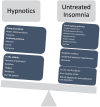Management of chronic insomnia using hypnotics: a friend or a foe?
- PMID: 38469060
- PMCID: PMC10900020
- DOI: 10.1007/s41105-021-00363-4
Management of chronic insomnia using hypnotics: a friend or a foe?
Abstract
Epidemiological studies suggest that 10-15% adults meet the present criteria for the diagnosis of insomnia disorder; however, there may be geographical variations. Untreated insomnia disorders have a number of adverse health consequences in addition to economic burden caused by it. Available guidelines mention that CBT-I should be preferred over hypnotics. However, several patients of chronic insomnia are not candidate for CBT-I and for them, hypnotics are the only answer. This paper reviews the literature to answer following questions: What is the current understanding regarding place of hypnotics for in management of insomnia disorder? How many patients misuse or abuse hypnotics, especially benzodiazepines, as commonly believed? Do we have data from human studies regarding low-dose benzodiazepine dependence? What does hypnotics produce-withdrawal insomnia, rebound insomnia or end of dose phenomenon? Are adverse effects of benzodiazepines worse than other psychotropic medications? Is prescription of hypnotics more troublesome than untreated insomnia disorder? Available literature suggests that there is an unreasonable negative bias attached to the use of hypnotics. Only a sub-set of patients who are prescribed hypnotics, meet the criteria for "dependence" in long term. Other patients either discontinue it (as insomnia remits) or change to occasional use (since insomnia may be relapsing remitting disorder), or continue using it in low dose (since insomnia reappears as hypnotics are discontinued, similar to increase in blood sugar after hypoglycemics are discontinued). Meta-analysis shows that adverse effects of hypnotics are comparable to that of other psychotropic medications. Considering the consequences and risks associated with untreated insomnia disorder, even long-term use of hypnotics is justified, however with the careful watch that patients are not increasing the dose. This approach is especially important in geographical areas where trained CBT-I therapists are not available.
Keywords: Chronic insomnia; Dependence; Hypnotics; Long-term use.
© The Author(s), under exclusive licence to Japanese Society of Sleep Research 2021.
Conflict of interest statement
Conflict of interestAuthors do not have any conflict of interest to disclose.
Figures
Similar articles
-
Main neuroendocrine features and therapy in primary sleep troubles.Rev Med Chir Soc Med Nat Iasi. 2012 Jul-Sep;116(3):862-6. Rev Med Chir Soc Med Nat Iasi. 2012. PMID: 23272543
-
Psychosocial intervention for discontinuing benzodiazepine hypnotics in patients with chronic insomnia: A systematic review and meta-analysis.Sleep Med Rev. 2019 Dec;48:101214. doi: 10.1016/j.smrv.2019.101214. Epub 2019 Oct 1. Sleep Med Rev. 2019. PMID: 31648145
-
Current Clinical Practice for the Use of Hypnotics to Manage Primary Insomnia in Adults in a Tertiary Hospital in Saudi Arabia: An Audit Study.Pharmacy (Basel). 2019 Jan 26;7(1):15. doi: 10.3390/pharmacy7010015. Pharmacy (Basel). 2019. PMID: 30691097 Free PMC article.
-
Development and acceptability of a decision aid for chronic insomnia considering discontinuation of benzodiazepine hypnotics.Neuropsychopharmacol Rep. 2022 Mar;42(1):10-20. doi: 10.1002/npr2.12219. Epub 2021 Nov 22. Neuropsychopharmacol Rep. 2022. PMID: 34807524 Free PMC article. Review.
-
An assessment of short-acting hypnotics.Drug Saf. 1995 Oct;13(4):257-70. doi: 10.2165/00002018-199513040-00005. Drug Saf. 1995. PMID: 8573298 Review.
References
-
- American Psychiatric Association . Diagnostic and statistical manual of mental disorders. 5. Arlington: American Psychiatric Association; 2013.
-
- Ballenger JC. Medication discontinuation in panic disorder. J Clin Psychiatry. 1992;53:26–31. - PubMed
Publication types
LinkOut - more resources
Full Text Sources

